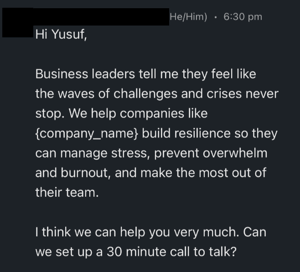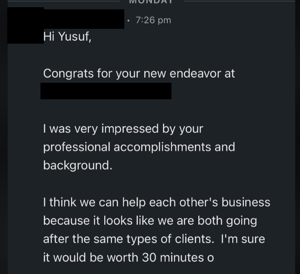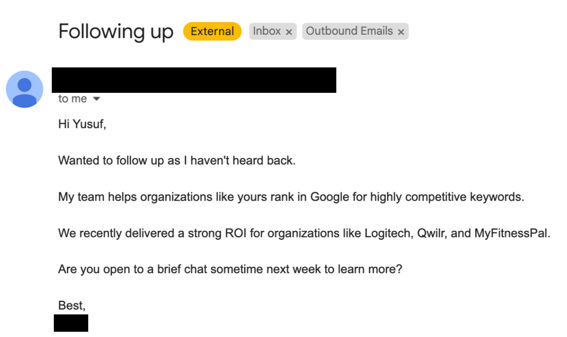How to Balance Short- And Long-Term SaaS Marketing
Balancing short and long-term SaaS marketing ensures that you get results today and next quarter. Find out four key strategies.

Yusuf Mahmoud
Well, single-touch lead generation campaigns are. When I surveyed SaaS startup CEOs and founders, 80% of them said lead generation was their biggest marketing concern going into 2023.
The joke used to be, “Where do you hide a dead body? On the second page of Google.” Now you could hide it in plain sight in your ads. For many SaaS companies, it doesn’t seem like anybody sees your ads.
You can’t expect to run a “cold” Google Ads campaign or LinkedIn lead gen form and expect it to convert into anything that actually has a positive impact on your pipeline. Unless you have a pretty low ACV and have invested in really strong product-led growth, your lead generation efforts need to work together. Your ads might catch a few people that are solution-aware or even product aware, but you’d have to thank your brand awareness efforts for that.
Alright, so there are four main lead generation practices companies need to leave in 2022 and four to take with you in the new year:
This is a mistake I saw several times with so many different B2B SaaS companies in 2022.
Recently, I was having a conversation with one of our newer clients, and he said, “our content is written for Google.” That’s bad. That’s the result of spending too much time obsessing over SEO rankings. Quality content will always be king. Stake a claim, write your own content, communicate your point of view, and talk about how you uniquely solve problems in your industry.
You can’t expect any marketer or any content writer, no matter how good they are, to come and write better content about YOUR company or YOUR product. Now, of course, you can train them over time, but your content strategy will never work if you and the whole executive team are not actually creating content.
Are you connecting your content with your prospects' buyer journey?
As a B2B SaaS company, creating customer-centric content is a must for driving high-quality conversions, adding value to your target audience at the right time, and better understanding their journey and key drivers of choice.
With this template, we'll walk you through the process of coming up with the right content topics and ideas to support your demand gen and sales enablement efforts.
The amount of emails and LinkedIn messages I get on a daily basis that have nothing to do with me is incredible. It doesn’t work. It negatively represents your company, damages your reputation, and it affects future relationships.
Are you sending the same generic message to everybody, or are you going after very specific people from very specific companies that you know would benefit from using your solution?
Here are just a few examples of some of the unpersonalized, uninspired outbound messages I see all too often:



If you’re alive and work at a B2B SaaS business, you’ve likely gotten those emails asking you to buy lead lists. Don’t do it. Even if you’re tempted. I learned this the hard way. These leads are almost never relevant. They waste your money, time, and resources, and honestly, they just clutter your CRM. “Leads” are not people you get off a list. Leads are people that showed genuine interest in your offering and wanted to learn more.
This is a personal pet peeve of mine. If I have to close your cookie consent bar, your webinar invitation pop-up, your chatbot, and that invitation to your nephew’s birthday, I’m leaving the site. On average, users wait 1-2 seconds for a site to load. That includes closing all the pop-ups. Adding a few seconds of work before someone even sees your site will have a huge impact on your abandonment rates.
This article was originally featured in the SaaS Growth Guide newsletter. If you're interested in seeing more resources like this one, subscribe to the newsletter and join 1,000+ B2B SaaS CEOs getting monthly executive marketing insights.
Demand generation and lead generation are not the same things. Lead generation is good for the short run. You’re trying to attract new users, build your pipeline, etc. Demand generation, on the other hand, is all the marketing and sales tactics you use to drive brand awareness. It happens before hand-raising and before anyone is necessarily interested in your solutions. It involves creating and nurturing demand for your product or service through various channels.
You need to invest in demand generation, even if you don’t see results right away, because it helps you reach a wider audience and build awareness over time, rather than just targeting a narrow group of leads. Here’s a quick article I wrote about the difference between demand generation and lead generation.
Customer interviews are a valuable tool for understanding your target audience and generating new demand for your business. 3 hours of customer interviews will give you more data than months of you doing your own research. Here’s how to make the most out of them:
I’ve never seen more success in my lead generation campaigns than when I’ve used data and input from customer interviews. Literally taking the customers' exact words and turning them into ad copy provided exceptional results.
An average person sees 4,000 - 10,0000 ads in a single day. You can’t expect your one Google search ad or one video ad on Youtube to convert anyone. You can, however, make sure that out of the 4,000 ads, they see you a few times on a few different channels that, one day, they actually convert. You need to run multi-touch ad campaigns that involve targeting the same audience with multiple touchpoints, such as display ads, social media ads, email marketing, etc.
It’s easier than ever now to run an ABM campaign, take that list and add it to LinkedIn, and run retargeting campaigns to that same list, which you can then take and use in a completely different channel. Just keep in mind that you are 1 out of 4-10k. It’s crucial for your content to break through the clutter and reach the right people through the channels they’re actually on. By the way, you only know those channels once you do your customer interviews.
The most successful ABM campaign I’ve ever run started 379 conversations which turned into almost 100 demos booked. All in less than two months. We had done some customer interviews and determined the three channels we wanted to use for ABM.
During that campaign, we reached out to every single person manually. We would look up what every person was talking about on LinkedIn or on Facebook (two channels that worked well for that industry), and we would edit every single message we sent them based on their interests. We even got our product team involved with writing some of the technical copy, so it was specific to exactly what that person needed.
The takeaway is, ABM needs to be specific. It actually needs to be “account-based.” Once you build a strong ABM foundation, the sky's the limit! Read more about building and launching a successful ABM campaign here.
The same lead-generation tactics that B2B SaaS marketers used five years ago are not going to work now. To see success in generating new demand for your business, it's important to invest in demand generation channels, conduct your customer interviews, run multi-touch ad campaigns, and build a strong ABM foundation.
For more on lead generation and how it’s differentiated from demand generation in SaaS marketing, check out this blog next.
Balancing short and long-term SaaS marketing ensures that you get results today and next quarter. Find out four key strategies.

Discover how founder-led growth in B2B SaaS can signal early success but also become a ceiling for scalability if not managed properly. Learn to...

Simplify your SaaS marketing with a four-role model to boost efficiency and reduce communication overhead in an AI-driven world. Learn how fewer...
